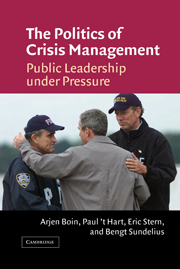Book contents
- Frontmatter
- Contents
- List of figures and table
- Acknowledgments
- 1 Crisis management in political systems: five leadership challenges
- 2 Sense making: grasping crises as they unfold
- 3 Decision making: critical choices and their implementation
- 4 Meaning making: crisis management as political communication
- 5 End games: crisis termination and accountability
- 6 Learning from crises and the politics of reform
- 7 How to deal with crisis: lessons for prudent leadership
- References
- Index
7 - How to deal with crisis: lessons for prudent leadership
Published online by Cambridge University Press: 22 September 2009
- Frontmatter
- Contents
- List of figures and table
- Acknowledgments
- 1 Crisis management in political systems: five leadership challenges
- 2 Sense making: grasping crises as they unfold
- 3 Decision making: critical choices and their implementation
- 4 Meaning making: crisis management as political communication
- 5 End games: crisis termination and accountability
- 6 Learning from crises and the politics of reform
- 7 How to deal with crisis: lessons for prudent leadership
- References
- Index
Summary
Introduction
In this book we have presented a number of empirical claims about leadership in crisis management. These are based on the findings of several decades of crisis research in various corners of the social sciences. In this final chapter, we take the lessons that emerge from theories and research findings on crisis management and translate these into recommendations for improving crisis management practices.
In the real world of crisis management, trade-offs must often be made among these various desirabilities. Policy makers face such challenges, make decisions, and have to live with the consequences of their actions or inactions. These consequences also matter to citizens who either suffer the results of governmental unpreparedness or reap the benefits secured by crisis-ready leaders and organizations.
This chapter attempts to transfer knowledge from academia to the corridors of public power. These research findings should prove helpful to those who have or take the public responsibility to deal with crises. A deeper and more comprehensive understanding of the subject enables public leaders to think about and engage in crisis management in a more reflective and responsible fashion. Our recommendations do not tell policy makers what to do and decide when they face the leadership challenges that emerge during crises. They do offer ideas and suggestions about how prudent leadership in crises might be exercised and organized.
Grasping the nature of crises
Let us begin with the nature of the beast.
- Type
- Chapter
- Information
- The Politics of Crisis ManagementPublic Leadership Under Pressure, pp. 137 - 157Publisher: Cambridge University PressPrint publication year: 2005



